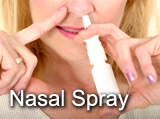Nasal sprays are used to treat symptoms of allergic rhinitis (hay fever), including sneezing, runny nose and congestion. They may also be used for the treatment of nasal polyps, reduce the nasal irritation caused by smoke and chemicals, and other medical conditions.

There are several types of nasal sprays available. Some, such as nasal corticosteroids, are available by prescription only. Others, such as nasal decongestants and nasal cromolyn areavailable without a prescription.
Types of nasal sprays
Nasal sprays are categorized by the way the active ingredient acts on the body.
- Nasal corticosteroids, such as Flonase® and Nasonex®, reduce the inflammation of the nasal mucosa. These may need to be used for several weeks to provide full benefit. It is often recommended that they be started several weeks before the onset of allergy symptoms, if predictable. Nasal corticosteroids are available by prescription only.
- Nasal anthistaminesreduce the itching and swelling that accompany allergic rhinitis caused by seasonal allergies. These are available by prescription only.
- Nasal decongestants (ie. Afrin®), reduces the swelling in the nasal passages making it easier to breath. Nasal decongestants are available without a prescription.
- Nasal anticholinergics (ipratropium®) helps to reduce symptoms of runny nose resulting for allergies and non-allerigies, such as vasomotor rhinitis.
- Nasal cromolyn (Nasalcrom®) is a mast cell inhibitor that is available without a prescription. It should be used at least one week before the onset of allergy symptoms to help reduce the onset of allergy symptoms.
It is important to know that decongestant nasal sprays can lose their effectiveness after 4-5 days and increasing amounts have to be used to get the same effect. This can lead to an over-reliance on these medications for allergy relief. If used too frequently it becomes difficult to stop because the body adjusts to its presence. Stopping after excessive use leads to a type of nasal congestion called "rebound congestion". This is why it is recommedned that nasal decongestats be used only for 2-3 days.
Which nasal spray is best for me?
Your doctor will recommend an allergy medication based on the severity and duration of your allergy symptoms, your response to past treatments, and your personal medical history.
Using nasal spray
When using a nasal spray, insert the nozzle into your nostril and aim the spray toward the outer wall of the nose. Pointing it toward the middle of the nose (towards the nasal septum) can lead to irritation and nose bleeds.
Source: Vivacare
Last updated : 1/8/2019